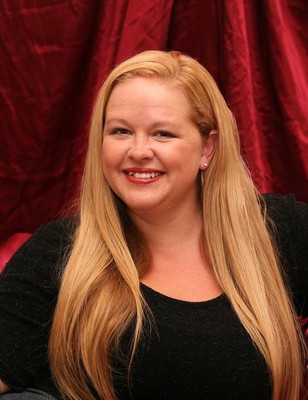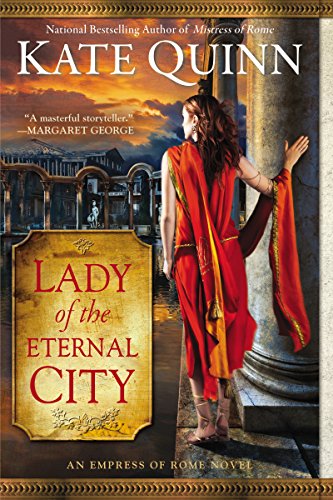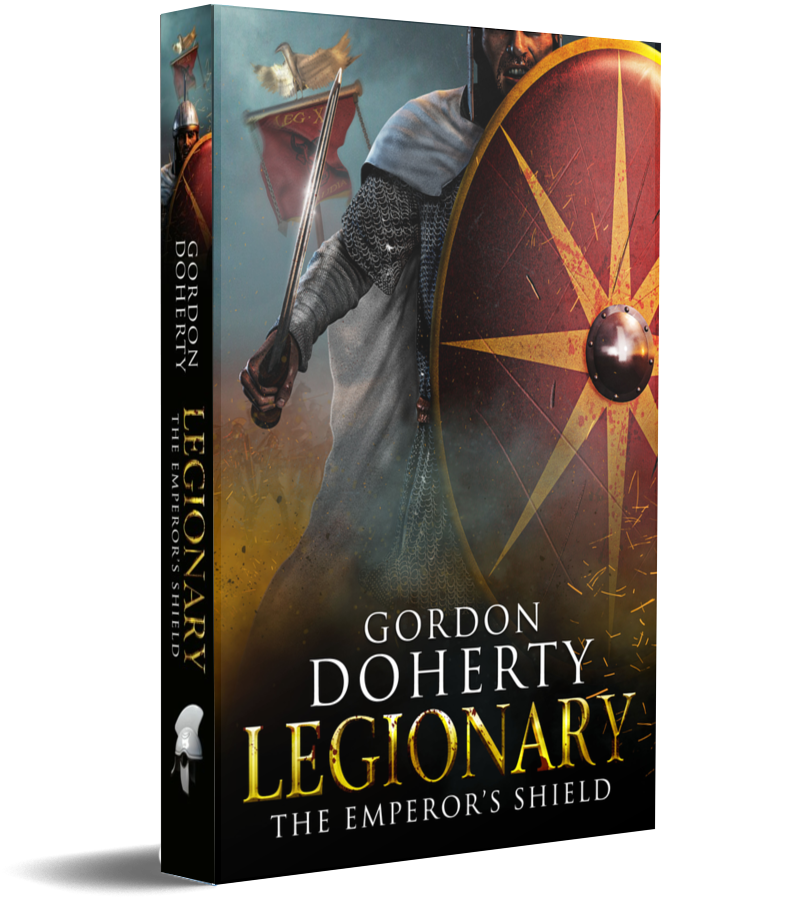|
A few months back I read and thoroughly enjoyed 'A Day of Fire', an anthology of historical tales intertwined around the final days of Pompeii. It was a quality read that introduced me to a few cracking new authors. I had read plenty of Ben Kane's work, and knew I'd enjoy his tale in the compilation, but I was delighted to discover that the other contributors were at the top of their game too. As a reader, 'A Day of Fire' had me captivated. As a writer, it was a pleasure and an education to experience so many other unique voices. So I'm delighted to welcome one of those fine writers, Kate Quinn, onto my website today to discuss her latest work 'Lady of the Eternal City' - volume 4 of the 'Empress of Rome' series - and to chat with her about her work and the intricacies, delights and challenges of writing about the distant past. Lady of the Eternal City - a short reviewQuinn's latest opus is a veritable weave of intrigue and tension: Emperor Hadrian is a wicked mix of might and madness; Sabina, the eponymous protagonist, sits by his side, wielding power yet walking on a knife’s edge, for her romantic dalliances with Vix, a weathered gladiator turned Praetorian, are daring in the extreme. And things are about to get a whole lot more tangled as this love triangle implodes when Hadrian’s eye turns to Vix’s son, Antinous. Quinn brilliantly depicts the fractious air that crackles across the empire as violent discord drives a wedge between Hadrian and Vix. Sabina's first love flees to Judea, taking his family with him and finding solace in the empire’s legions in that distant, dusty land. But fate conspires to draw him back to the empire’s heart, to Sabina and the court of the maddening Emperor. Tragedy and stark choices await as the tale reaches a gripping climax. I typically enjoy military-focused historical fiction, and this tale does have its action-packed moments, but it excels in delivering an engrossing measure of court and palace intrigue that utterly distracted me from my usual legion-fest fix. The author’s deft hand at characterisation was probably the key to this: with male and female characters equally vivid and strong (not always the case in historical fiction). Crucially, the history/storytelling balance is perfect, with neither dominating but both supporting the tale firmly. I'd challenge any reader not to lose themselves in this sparkling yarn. Very, very well done. Q&A with KateGordon: When I was browsing your back-catalogue I had to smile wryly when I saw that your two flagship series (Empress of Rome and The Borgia Chronicles) are set over a millennium apart, for I too know how history drags you into deep, dark and often distant corners (I leapt from 4th century AD Rome to 11th century AD Byzantium - simply had to be done!). Can you describe what aspects of these two chronologically disparate eras demanded your attention? Is there a common theme in each setting that links the two series?
Kate: I'm fascinated by so many historical eras (Tudor England! Ancient Egypt! The Hundred Years' War!) that I'm just sorry I don't have the hours to write books set in all those periods. What really fascinates me fiction-wise is power—not so much the people who wield it themselves, because those people are seldom my direct protagonists, but the people on the fringes of power: soldiers in the shadows of the empire-building Emperors; wives and concubines on the elbows of Emperor and Pope alike; slaves and servants hovering unseen around the mighty. Who are these people, and how do they effect the shifts of power? Because they do, and history changes because of it. Gordon: Characterisation is, in my opinion, your strongest asset and really makes your story live in the reader's mind long after they've finished reading. Do you find it difficult to make a real, living character from often vague and contradictory historical chronicles? Kate: Thanks for the praise! I like taking historical figures with a lot of blank space in their bios; it gives me room to play. Empress Sabina was one of those; we have a handful of dates and some interesting not-verifiable rumors about her (that she and her husband hated each other; that she had no objection to his lover Antinous; that she possibly had an affair with her Praetorian Prefect) but not a lot else—and yet she was the foremost woman of the Roman Empire. I loved filling in the gaps of her life with my own imagination, and I have no problem using the historical rumors that come down as well as the historical facts, if I think the story would benefit (though I'm careful to point out which is which in my author's note). I decided to use the rumor about Sabina's affair with her Praetorian, because it fitted the story I wanted to tell—on the other hand, when I wrote about the Borgias I decided to depict the famous incest rumors as pure slander because that fitted my story better. Gordon: I'm with you 100% re filling in gaps. I love finding contradictions or ambiguities in historical source texts - perfect chronicles that leave little to the imagination aren't half as much fun to work with. Legionary Gordon: Have you ever felt guilty about portraying a character in a speculative, negative light? I ask because I know I have done this and wondered if I'll end up in eternal damnation (see Psellos of Byzantium in Strategos)! Kate: I was probably very unfair to Emperor Trajan's wife Plotina, whom I portrayed in “Empress of the Seven Hills” as a ruthless schemer with delusions of godhood. Historically she comes across as a perfectly inoffensive woman who kept to the background, perhaps doing some mild tinkering with Trajan's deathbed scene to make sure Hadrian got the throne—but she certainly wasn't the semi-demented cast-iron bitch I made of her! What can I say, my story needed a villain and I crafted one out of some historical rumors that cling to the hem of Empress Plotina's reputation. Hadrian, however, who I wrote in a more complicated villainous light in “Lady of the Eternal City,” I didn't feel so bad about. The real man was so contradictory no depiction could ever be called the “right” one. Gordon: I find battle scenes and depictions of military camaraderie quite natural to write, but I really have to focus in order to craft poignant, touching scenes outwith this sphere. I hope this isn't gender stereotyping, but I notice that your tales don't rely solely/mainly on war scenes, so I wondered if you find the converse true? If not, are there any particular types of scenes you do have difficulty with and how do tackle these? Kate: I suspect we are more alike than you think, Gordon, because I find fight scenes and action a snap to write, and can agonize for hours over 300 words of poignant love-scene or touching interior monologue! My critique partners harp on me for it; whenever my rough draft comes back it's always covered with “Stop describing the chariot race and tell us what these characters are thinking and feeling!” So balancing both is something I'm always working on. I think the trouble with being a female writer of historical fiction is that unless you're writing a pure blood-and-battle book in the Cornwell/Kane line—and I prefer a mix, both male and female narrators, both blood-and-battle and bedroom-and-council-chamber—you get a push for less action in your books, and the packaging that goes with it. I get covers with girls in pretty dresses, and a lot of my battle sequences get thinned out. Gordon: Very interesting. I'll have to get a hold of a 'director's cut' of one of your books some day :) Gordon: I found your knowledge of historical detail impressive and, to my eye, immaculate. What's your process for researching - do you use the looser resources on the web (Wikipedia etc.) to guide you then tighten up with source texts, or do you avoid the vagaries of the web and dive in to the trusted texts? How long would you say you spend on research vs writing? Kate: I go to online sources for fast fact-finding or for initial foraging—when it comes to the deep research, I still tend to fall back on books. Anthony Everitt's splendid biography of Hadrian was my Bible for this past book; I wore it to tatters. As for writing vs. researching, I do a lot of intensive reading and researching in the beginning as I'm crafting my plot, and then plunge into writing. But the research is never really done, is it? Sometimes you have to throw your daily wordcount out the window and spend three hours researching the Eleusinian Mysteries in greater depth, because the next scene requires it and you can't move forward until you've got more facts at your fingertips. Gordon: Hah - yes, I know only too well. Sometimes I try to leave a marker in my script (e.g. "Research Persian execution methods and update this scene") and move on, but the obsessive in me usually drags me back to do the research there and then. Gordon: How do you deal with historical uncertainty? For example, if you have only thin evidence for, say wedding customs in 2nd century AD Rome, how do you go about filling in gaps or choosing appropriate objects/sayings/ceremony? Kate: I try to focus my scene around the details that I know are right (red wedding veils and the bridal torch! I know for sure that 2nd century Roman weddings had them, so in they go). If I have to fill in the gap myself, I try to let common sense be the guide. Years ago, I remember obsessively researching camp followers and the Roman legions, because I really wanted women in a baggage train for my story, but mostly sources said women weren't allowed when legions were on the march. But I sat back and thought “There has never been an army in the history of the world that didn't have a trail of whores somewhere in the vicinity. Never. So as long as the legionaries aren't on an absolute killer of a speed-march, yes, I will include women in the baggage train.” That felt like a common-sense compromise to a historical gap. Gordon: What's next on the horizon for you? I hope there will be more from both of your series? And please tell me the Day of Fire gang will work together again... Kate: I'm pondering new book ideas at the moment. I'd like to write more in Rome and in the Renaissance, but the next is probably going to be something very new in a very different era. (Though it will probably still revolve in some way around people in the fringes of power, and how they influence the powerful.) And yes, I am hopeful that the Day of Fire gang will get another project going. I've got some ideas there, too . . . Gordon: Superb! Thanks for the chat, Kate, and please keep up the top work! You can visit Kate's website here, and be sure to check out her works and those of the Day of Fire gang.
0 Comments
Leave a Reply. |
AuthorGordon Doherty: writer, history fan, explorer. My Latest BookArchives
March 2023
Categories |




 RSS Feed
RSS Feed